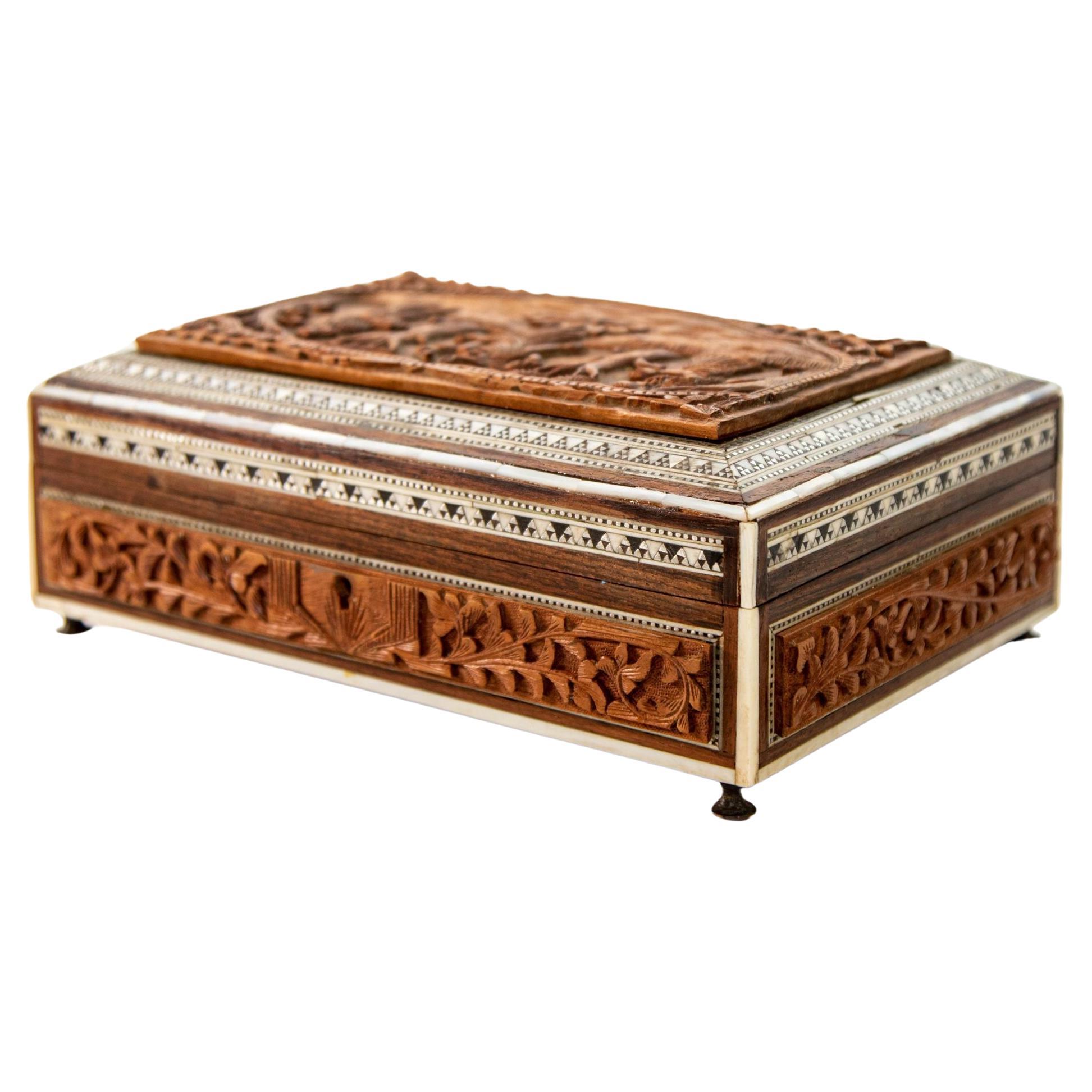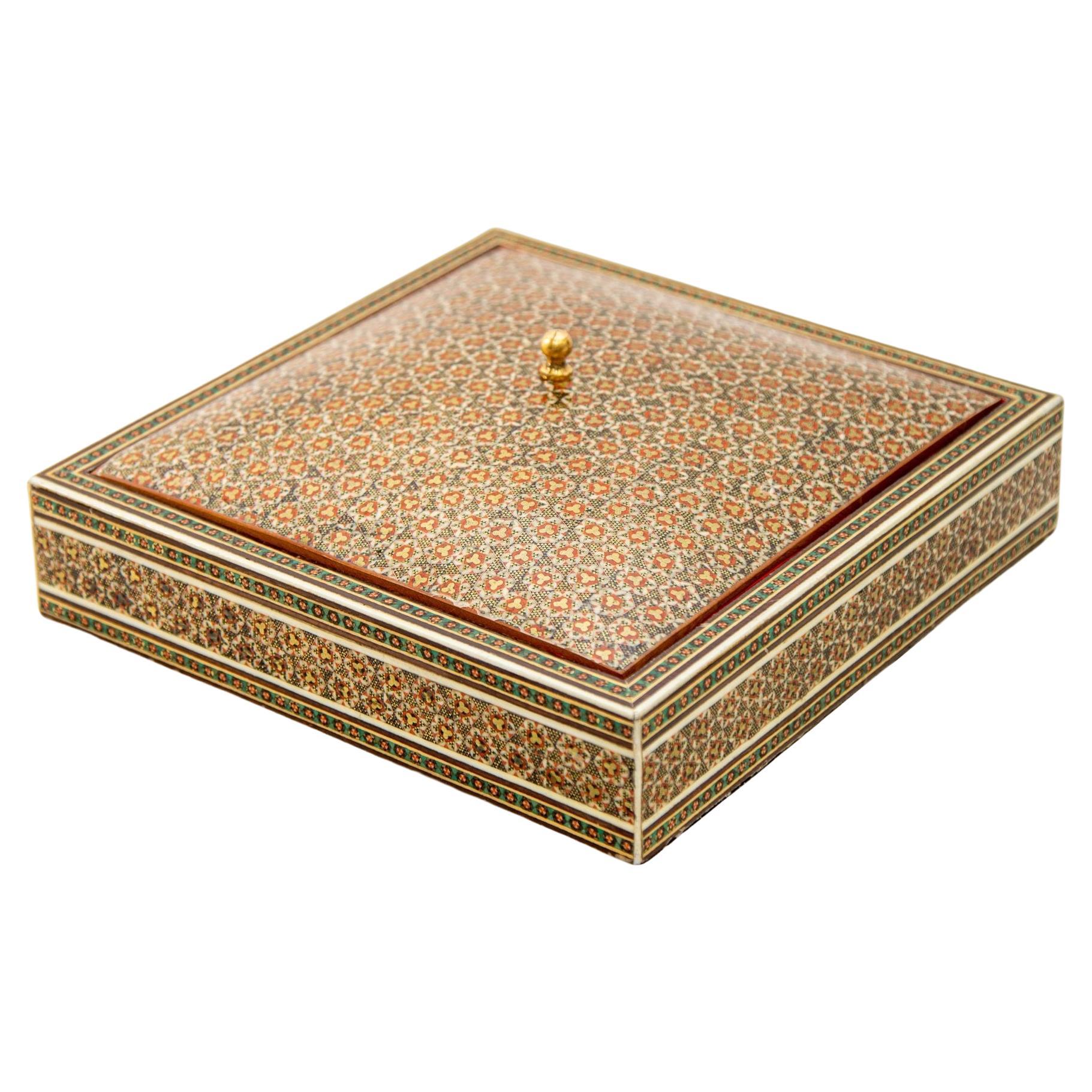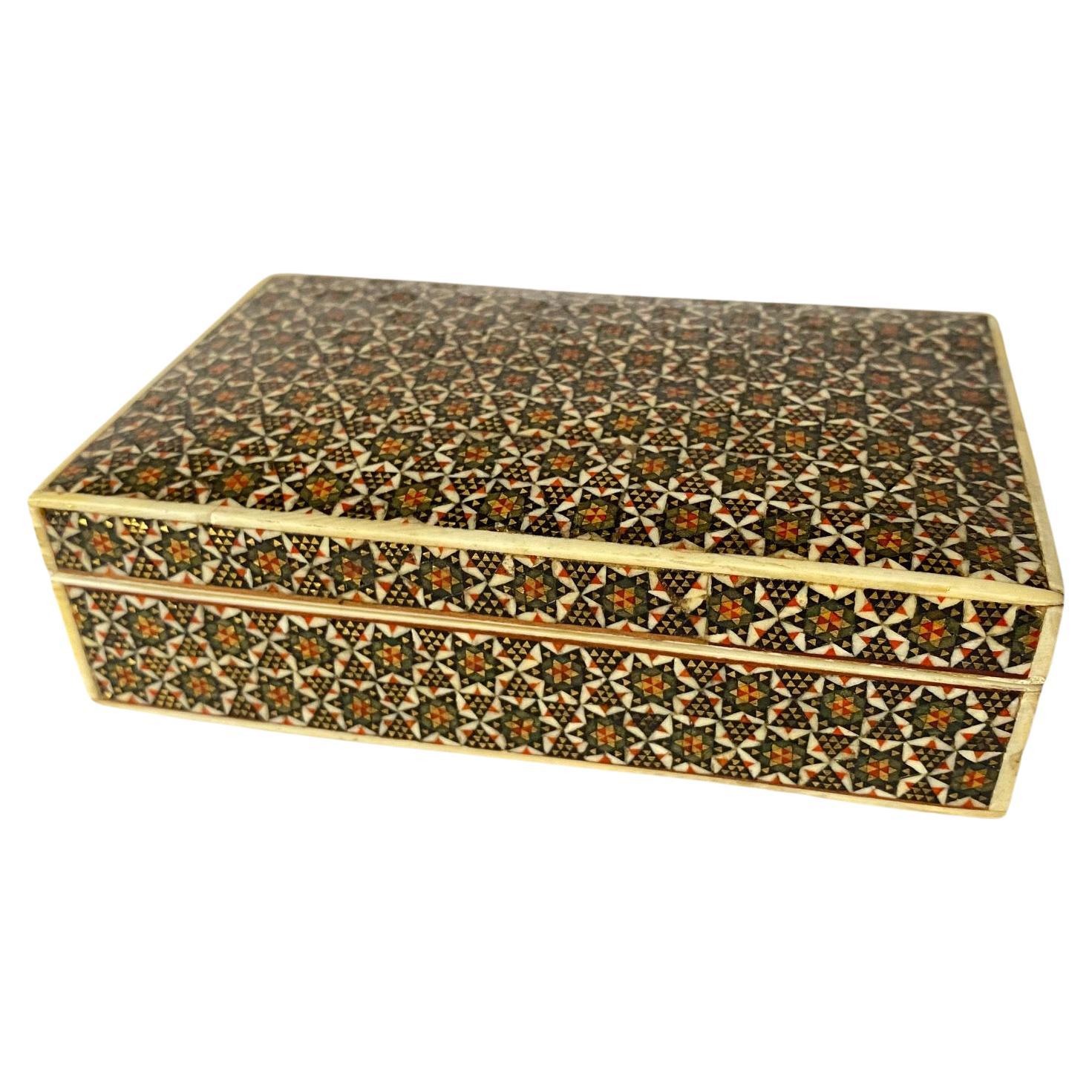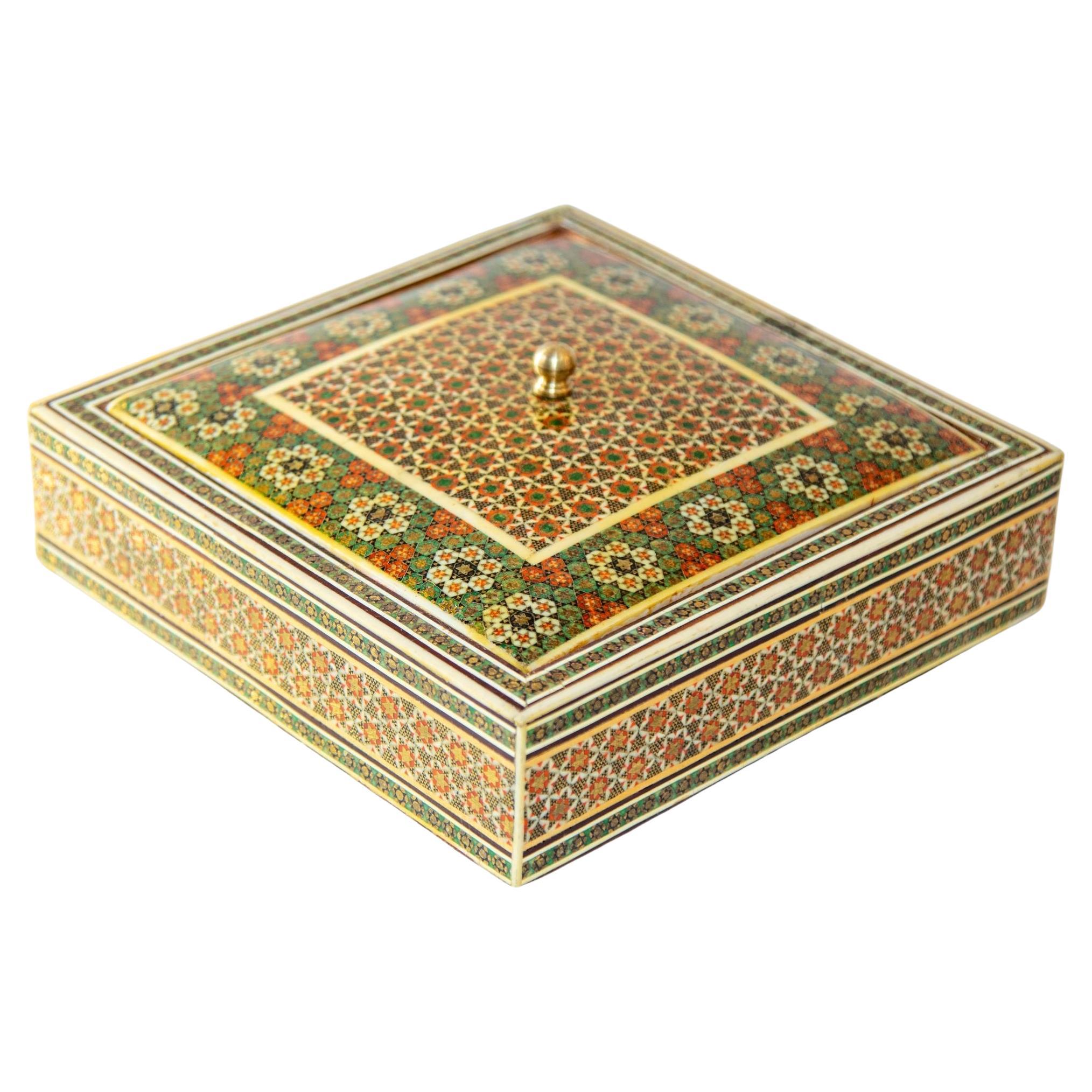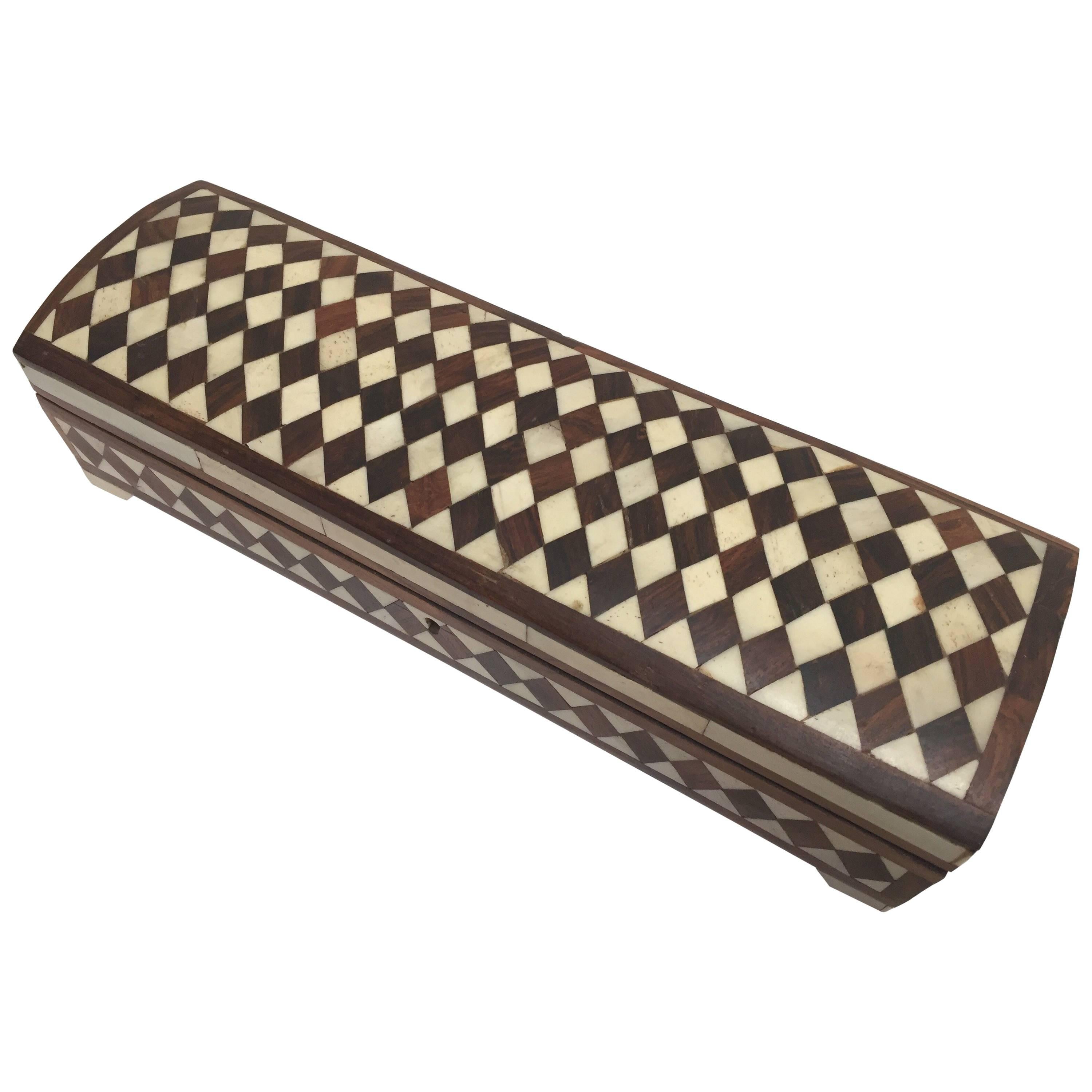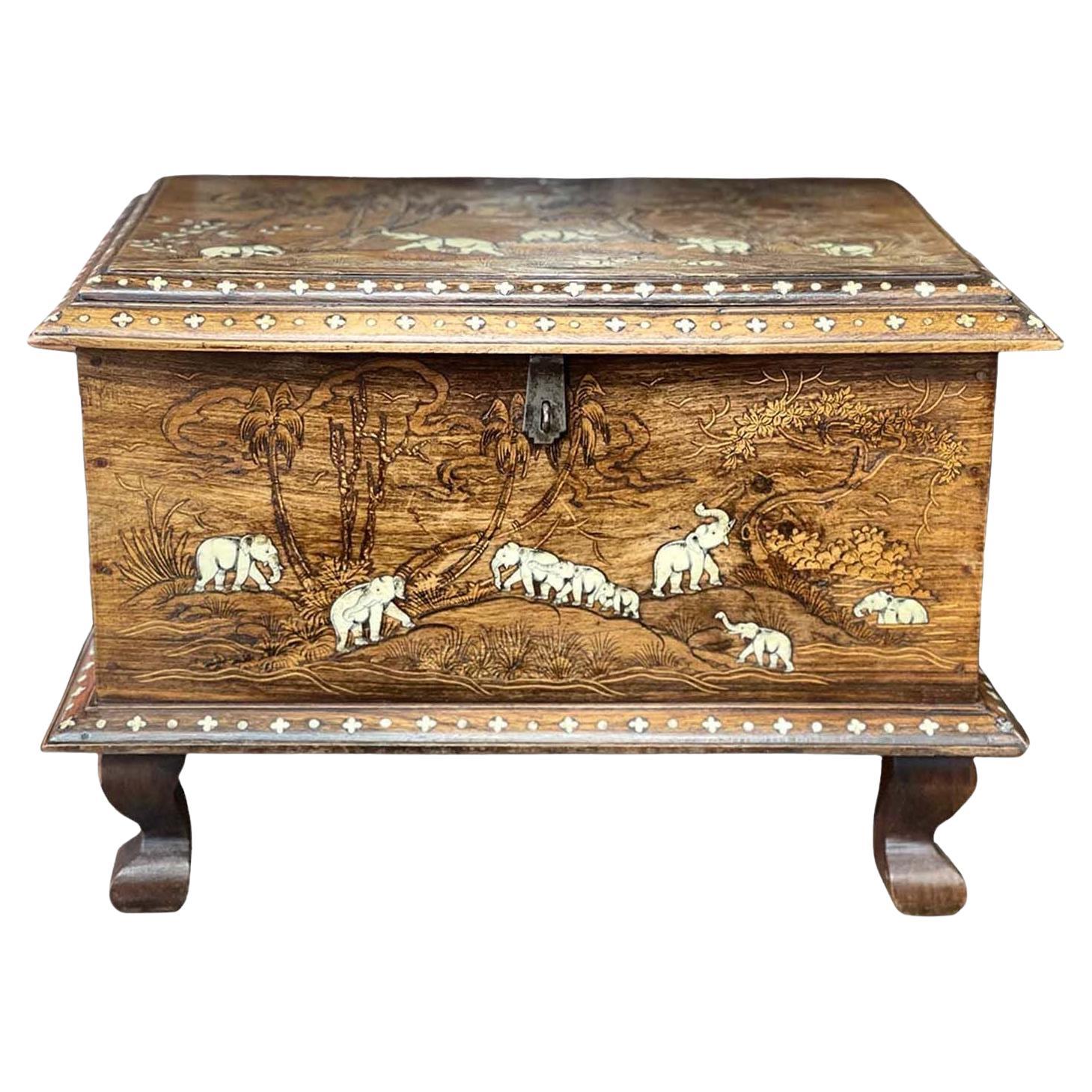Items Similar to Anglo Indian Colonial Brass Inlaid Teak Jewelry Box
Video Loading
Want more images or videos?
Request additional images or videos from the seller
1 of 16
Anglo Indian Colonial Brass Inlaid Teak Jewelry Box
About the Item
A Beautiful Anglo Indian, Colonial, brass inlaid teak jewelry lidded box made for the English market.
handcrafted with floral and hearts brass inlays on top are surrounded by brass inlaid border, intricate brass inlays design of florals and scrolls carries through to all four sides so will display nicely on a shelf, desk or coffee table.
Displays a desirable aged patina and the teak wood shows fine grain interest and deep caramel hues.
A large Anglo-Indian teak colonial Campaign casket with brass inlay, the hinged cover opens to reveal an original fitted interior with two compartments interior lined with red velvet.
This is a distinctive and highly appealing vintage semi antique Anglo Indian jewelry box or writing box.
A treat for the coffee table or desk.
Made for the English European market.
handmade in India circa 1950.
Measures: height: 3.5 in., width: 12 in., depth: 8 in.
- Dimensions:Height: 3.5 in (8.89 cm)Width: 12 in (30.48 cm)Depth: 8 in (20.32 cm)
- Style:Anglo-Indian (In the Style Of)
- Materials and Techniques:
- Place of Origin:
- Period:
- Date of Manufacture:1950
- Condition:Wear consistent with age and use.
- Seller Location:North Hollywood, CA
- Reference Number:
About the Seller
5.0
Platinum Seller
These expertly vetted sellers are 1stDibs' most experienced sellers and are rated highest by our customers.
1stDibs seller since 2011
2,637 sales on 1stDibs
Typical response time: 1 hour
- ShippingRetrieving quote...Ships From: North Hollywood, CA
- Return PolicyA return for this item may be initiated within 7 days of delivery.
More From This SellerView All
- Antique Anglo-Indian Vizagapatam Jewelry Inlaid Sadeli Footed BoxLocated in North Hollywood, CAAntique 19th century Anglo-Indian jewelry, trinket footed box, inlay with ebony, mosaic marquetry Sadeli work and a carved Hindu scene on top. The box case is made from sandalwood wi...Category
Early 20th Century Indian Anglo-Indian Decorative Boxes
MaterialsWood, Bone, Mother-of-Pearl
- 1950s Anglo Indian Style Micro Mosaic Inlaid Jewelry BoxLocated in North Hollywood, CA1950's Anglo Indian, Indo Persian style micro mosaic inlaid jewelry box with lid. Large vintage intricate inlaid middle Eastern Persian style box with floral and geometric Islamic Mo...Category
Mid-20th Century Indian Anglo-Indian Decorative Boxes
MaterialsFruitwood
- 1950s Anglo Indian Micro Sadeli Mosaic Inlaid Jewelry BoxLocated in North Hollywood, CA1950s Anglo Indian Micro Sadeli Mosaic Inlaid Jewelry Box. DIMENSIONS: 7ʺW × 7ʺD × 2.5ʺH. Indo Persian Moorish style micro mosaic inlaid jewelry box with lid. Intricate inlaid Anglo ...Category
Mid-20th Century Indian Moorish Decorative Boxes
MaterialsFruitwood, Bone
- Vizagapatam Anglo-Indian Rectangular Box with Bone InlaidLocated in North Hollywood, CAFabulous Anglo-Indian decorative box inlaid. Made in Vizagapatam, situated on the south east coast of India, near Madras. Great decorative inlaid pen box or jewelry box. Inside dimen...Category
20th Century Indian Anglo-Indian Decorative Boxes
MaterialsSandalwood
- 1950s Anglo Indian Style Rosewood Box with Brass Tree of Life Symbol InlaidLocated in North Hollywood, CA1950s Antique Anglo Indian Victorian Style Rosewood Box with Brass Tree of Life Symbol Inlaid. An elegant Anglo Indian Victorian style rosewood box in rectangular shape.A Beautiful A...Category
Mid-20th Century Indian Anglo-Indian Decorative Boxes
MaterialsRosewood
- Anglo Indian Micro Sadeli Mosaic Inlaid Hexagonal BoxLocated in North Hollywood, CAAnglo Indian Moorish style micro mosaic inlaid jewelry box with lid. Intricate inlaid Anglo Indian box with floral and geometric Moorish Sadeli design in an octagonal shape form with micro mosaic marquetry, very fine artwork. Museum collector piece like the one in Doris Duke Islamic Art Museum. The repeating geometric patterns of Sadeli Mosaic...Category
Early 20th Century Moorish Jewelry Boxes
MaterialsFruitwood
You May Also Like
- Anglo Indian Micro Mosaic Inlay Jewelry BoxLocated in New York, NYExquisitely crafted early 20th century Anglo Indian micro mosaic Sadeli box with gorgeous antique Persian geometric pattern. The finely detailed box featu...Category
Early 20th Century Indian Anglo-Indian Jewelry Boxes
MaterialsFruitwood, Bone
- Anglo-Indian Inlaid Elephant Motif BoxLocated in Los Angeles, CAAnglo-Indian inlaid box with elephant motif (circa 1920s). Dimensions: 14"H x 19.5"W x 13"D.Category
Vintage 1920s Indian Decorative Boxes
MaterialsWood
- Anglo Indian Brass Box with Bone InlayLocated in Stamford, CTA handsome and unusual brass strongbox with intricate patterned polished bone inlay on the top. The inside with a till, the lid of the till decorated with incised designs. This box c...Category
Early 20th Century Sri Lankan Anglo-Indian Decorative Boxes
MaterialsBrass
- Large Anglo Indian Elephant BoxLocated in Palm Beach, FLFolky silvered metal elephant handcrafted with a charming whimsical form hammered and etched designs that unexpectedly opens as a trinket box.Category
Early 20th Century Indian Anglo-Indian Decorative Boxes
MaterialsMetal
- Anglo Indian Metal Cat BoxLocated in Palm Beach, FLWhimsical silvered metal feline handcrafted with a folky charm that is hammered and etched in a decorated floral design that unexpectedly opens as a trinket box.Category
Early 20th Century Indian Anglo-Indian Animal Sculptures
MaterialsMetal
- Anglo-Indian Style Penwork BoxLocated in New York, NYIn the form of a house; the hinged top opening to an open interior. In the spirit of early nineteenth century pinworm on ivory boxes that were highly collected in Regency England.Category
20th Century English Anglo-Indian Decorative Boxes
MaterialsIvory, Wood
Recently Viewed
View AllMore Ways To Browse
Heart Box
Vintage In English
Decorative Shelf
Anglo In
Indian Objects
Vintage Display Box
Anglo India
Indian Jewelry
Indian Jewellery
Indian Jewlery
Used Indian Jewelry
Vintage Large Box
Large Vintage Boxes
Retro Mid Century Jewelry Box
Retro Display Boxes
English Colonial Furniture
English Colonial
Jewelry Box Vintage Large
